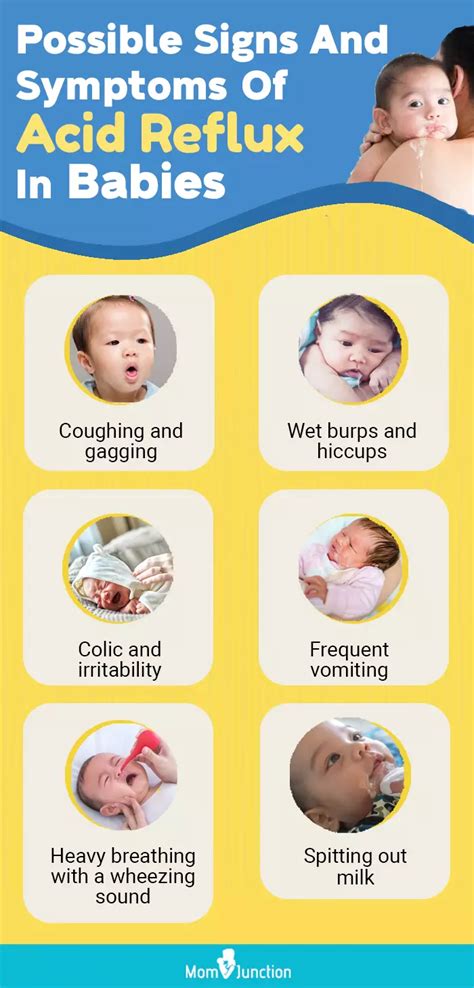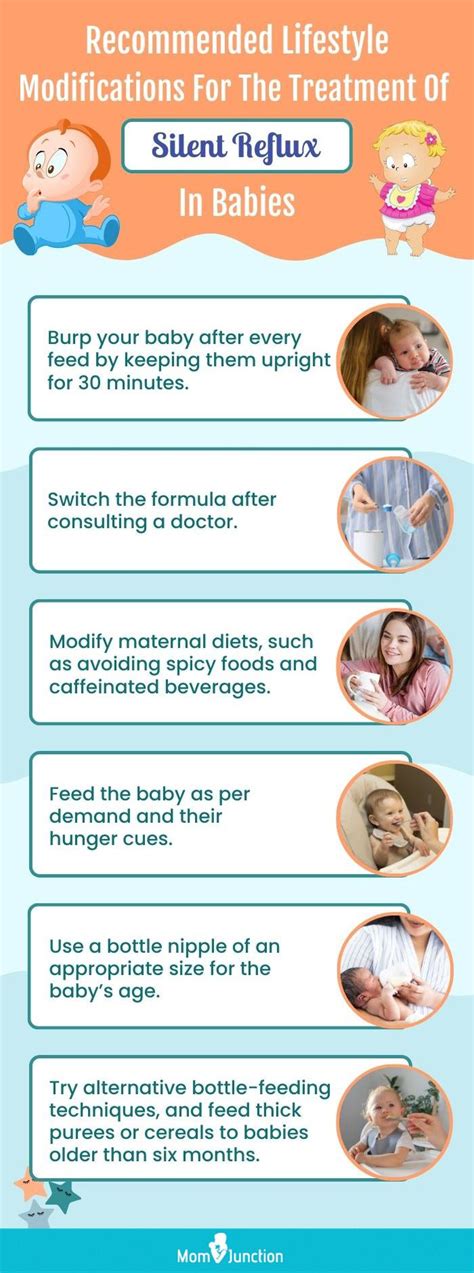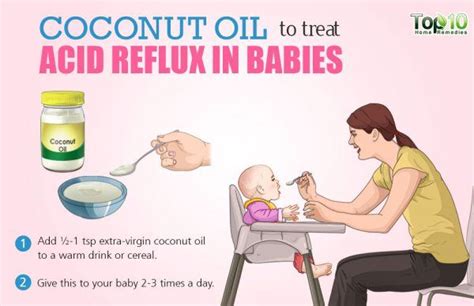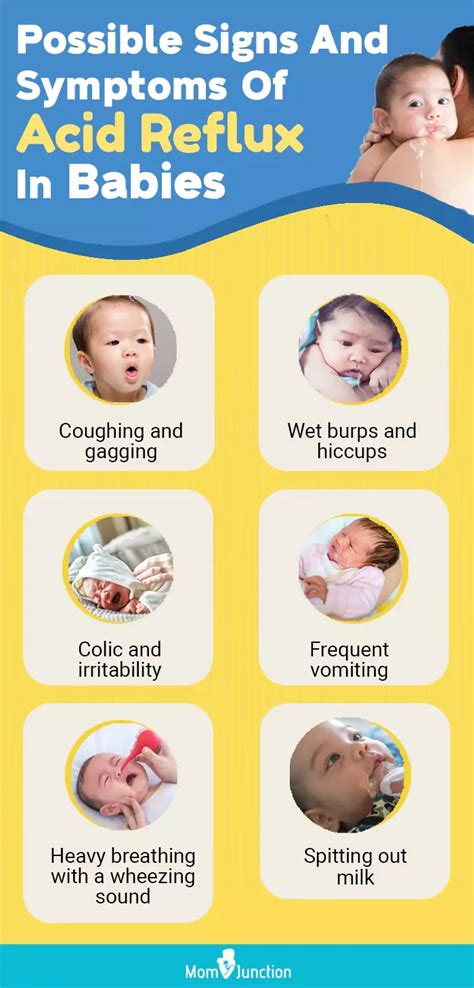Intro
Acid reflux in babies is a common condition that can cause discomfort and pain for the little ones. It occurs when the stomach acid flows back up into the esophagus, causing irritation and inflammation. As a parent, it can be distressing to see your baby suffering from acid reflux, but there are several tips and strategies that can help alleviate the symptoms and provide relief. In this article, we will explore five tips for managing acid reflux in babies, including dietary changes, positioning techniques, and lifestyle modifications.
The first few months of a baby's life are crucial for their development, and acid reflux can be a significant challenge during this period. Babies with acid reflux may exhibit symptoms such as spitting up, vomiting, and refusal to feed. In severe cases, acid reflux can lead to complications like respiratory problems, ear infections, and dental erosion. Therefore, it is essential to recognize the signs of acid reflux in babies and take proactive steps to manage the condition.
Acid reflux in babies can be caused by a variety of factors, including premature birth, gastroesophageal reflux disease (GERD), and food allergies or intolerances. Some babies may also experience acid reflux due to anatomical issues, such as a short esophagus or a weak lower esophageal sphincter. Understanding the underlying causes of acid reflux is crucial for developing an effective treatment plan. By working with a pediatrician and making lifestyle changes, parents can help their babies feel more comfortable and reduce the risk of complications.
Understanding Acid Reflux in Babies

Acid reflux in babies is often diagnosed based on symptoms and physical examination. A pediatrician may perform tests such as a barium swallow or an upper GI series to confirm the diagnosis and rule out other conditions. In some cases, a baby may be referred to a specialist, such as a gastroenterologist, for further evaluation and treatment. By understanding the diagnosis and treatment options, parents can make informed decisions about their baby's care and work with their healthcare provider to develop a personalized treatment plan.
Causes and Risk Factors
Acid reflux in babies can be caused by a combination of factors, including: * Premature birth * Gastroesophageal reflux disease (GERD) * Food allergies or intolerances * Anatomical issues, such as a short esophagus or a weak lower esophageal sphincter * Family history of acid reflux or GERD * Exposure to tobacco smoke or other environmental toxinsDietary Changes for Acid Reflux in Babies

Dietary changes can play a significant role in managing acid reflux in babies. Some tips for modifying a baby's diet include:
- Breastfeeding: Breast milk is easily digested and can help reduce the risk of acid reflux.
- Formula feeding: For babies who are formula-fed, a pediatrician may recommend a hypoallergenic or elemental formula to reduce the risk of acid reflux.
- Thickening feedings: Adding a small amount of rice cereal or other thickening agents to a baby's feedings can help reduce the risk of acid reflux.
- Avoiding trigger foods: Some foods, such as citrus fruits or tomatoes, can trigger acid reflux in babies. Avoiding these foods or introducing them slowly can help reduce the risk of symptoms.
Positioning Techniques for Acid Reflux in Babies
Positioning techniques can also help alleviate the symptoms of acid reflux in babies. Some tips include: * Elevated positioning: Placing a baby in an elevated position, such as a wedge pillow or a car seat, can help reduce the risk of acid reflux. * Upright positioning: Keeping a baby upright after feedings can help reduce the risk of acid reflux. * Avoiding tight clothing: Tight clothing can put pressure on a baby's stomach and worsen acid reflux symptoms.Lifestyle Modifications for Acid Reflux in Babies

Lifestyle modifications can also play a significant role in managing acid reflux in babies. Some tips include:
- Avoiding tobacco smoke: Exposure to tobacco smoke can worsen acid reflux symptoms in babies.
- Reducing stress: Stress can exacerbate acid reflux symptoms in babies. Practicing stress-reducing techniques, such as meditation or deep breathing, can help alleviate symptoms.
- Getting enough sleep: Getting enough sleep can help reduce stress and alleviate acid reflux symptoms in babies.
Medications for Acid Reflux in Babies
In some cases, medications may be prescribed to help manage acid reflux in babies. Some common medications include: * Antacids: Antacids can help neutralize stomach acid and reduce the risk of acid reflux. * Histamine-2 (H2) blockers: H2 blockers can help reduce the production of stomach acid and alleviate acid reflux symptoms. * Proton pump inhibitors (PPIs): PPIs can help reduce the production of stomach acid and alleviate acid reflux symptoms.Home Remedies for Acid Reflux in Babies

There are several home remedies that can help alleviate the symptoms of acid reflux in babies. Some tips include:
- Ginger: Ginger has natural anti-inflammatory properties and can help alleviate acid reflux symptoms.
- Aloe vera: Aloe vera has natural soothing properties and can help alleviate acid reflux symptoms.
- Chamomile: Chamomile has natural calming properties and can help alleviate acid reflux symptoms.
When to Seek Medical Attention
While acid reflux is a common condition in babies, it can sometimes be a sign of a more serious underlying condition. If a baby is experiencing any of the following symptoms, it is essential to seek medical attention: * Vomiting blood or black tarry stools * Refusal to feed * Difficulty breathing * Fever over 100.4°F (38°C) * Abdominal pain or tendernessConclusion and Next Steps

Acid reflux in babies can be a challenging condition to manage, but with the right combination of dietary changes, positioning techniques, and lifestyle modifications, parents can help alleviate symptoms and reduce the risk of complications. By working with a pediatrician and staying informed about the latest treatment options, parents can make informed decisions about their baby's care and help their little one feel more comfortable. If you have any questions or concerns about acid reflux in babies, do not hesitate to reach out to your healthcare provider for guidance and support.
We invite you to share your experiences and tips for managing acid reflux in babies in the comments below. Your input can help other parents who are going through similar challenges. Additionally, if you found this article helpful, please share it with your friends and family on social media to help spread awareness about acid reflux in babies.
What are the common symptoms of acid reflux in babies?
+Common symptoms of acid reflux in babies include spitting up, vomiting, and refusal to feed. Some babies may also experience respiratory problems, ear infections, and dental erosion.
How can I prevent acid reflux in my baby?
+To prevent acid reflux in your baby, try to breastfeed or use a hypoallergenic formula, thicken feedings with rice cereal, and avoid trigger foods like citrus fruits or tomatoes. Additionally, keep your baby upright after feedings and avoid tight clothing.
When should I seek medical attention for my baby's acid reflux?
+If your baby is experiencing vomiting blood or black tarry stools, refusal to feed, difficulty breathing, fever over 100.4°F (38°C), or abdominal pain or tenderness, seek medical attention immediately.
